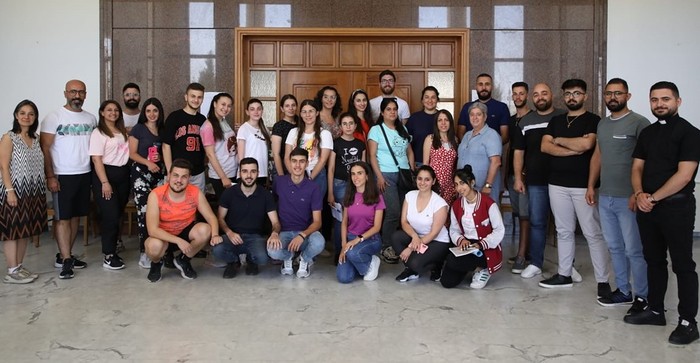First PRO ORIENTE youth workshop in Syria
27 young women and men from different churches came together in Damascus at the end of July – Another youth workshop took place in Lebanon – Workshop videos now available online

Damascus/Beirut/Vienna, 08.08.23 The ecumenical Middle East youth workshops, which the PRO ORIENTE foundation has been conducting together with the “We choose abundant life” group since 2022, have been continued this summer as well. The young people reflect on the political, economic, social and ecclesial situation in their home countries and develop future scenarios for improvements. For the first time, a workshop was also held in Syria. In Damascus, 14 young men and 13 young women belonging to six different churches came together: the Melkite, Greek Orthodox, Syrian Catholic, Syrian Orthodox, Maronite and Evangelical churches.
The special situation in Syria in the context of war and violence, as well as the situation after the earthquake in February, had prompted those responsible for the workshop to adapt the program for Syria. The new concept, developed by PRO ORIENTE program director Viola Raheb and Father Gabriel Hachem, included spiritual and psychological support and counseling in addition to the proven workshop topics. For this purpose, two psychotherapists and a mediation trainer were engaged to work with the young people, as Raheb reported. Sister Emilie Tannous from the “We choose abundant life” group led the workshop on site.
Raheb: “All young people have experienced and survived the war. All have experienced violence; many have defended their cities or villages or helped the injured and/or internally displaced.” Among the many challenges mentioned by the young people were the effects of demographic shifts in their towns and villages. “Many people are no longer there, having fled or emigrated. Many have also died in the war,” said Raheb. Today, the lives of young people in Syria are strongly characterized by poverty and very high inflation, a lack of employment opportunities and a lack of future prospects overall.
With regard to ecumenical experiences, the workshop was described by participants as the first opportunity to meet with Christians from other churches and to learn about and exchange information on the traditions of the other churches.
It became clear from the workshop contributions that this often-self-imposed isolation of the churches was strongly related to the fear of proselytizing. Often church leaders would prevent cooperation with other churches. Raheb: “There is some youth work in the various churches in Syria, but hardly any programs in which young Christians are offered ecumenical education.”
Raheb, who could not be present in Syria in person and was connected online, expressed her gratitude ‘that we were able to hold the first workshop in Syria’. The feedback from the young people, that for the first time they had the opportunity to put their experiences into words and to be strengthened by professional and spiritual support, “makes us humbly realize how little it takes to support people broken by war and to fulfill our Christian mission,” said Raheb. The workshops are supposed to continue in Syria.
Leadership training in Lebanon
Another PRO ORIENTE workshop took place from July 21 to 23 at the Al Liqa' Center in Rabwah near Beirut in Lebanon. The workshop was titled “Ecumenical Work and Leadership Training”. 23 young people from different churches participated. They came from the Maronite, Armenian Orthodox, Greek Orthodox, Syrian Catholic, Syrian Orthodox, Roman Catholic, Chaldean and Protestant churches.
Following a meeting of young people from the Middle East in Austria in January 2023, PRO ORIENTE and the “We choose abundant life” group, together with young people from the region, had formulated the thematic priorities for further workshops. The central topics of the training are ecumenism, dealing with diversity and leadership training. The workshop in Lebanon was planned by Viola Raheb and Fr. Rouphael Zgheib along these lines. The local team consisted of Fr. Rouphael Zgheib, John Daniel from Egypt and Tania Abu Shrabiya.
Speakers on the topic of ecumenism were Prof. Souraya Bechealany and Rev. Najla Kassab. The most important ecumenical challenges in the context of the Middle East were discussed in the working groups. According to participants, these included the lack of solidarity and the lack of a common vision among all local churches, the non-acceptance of the other and the pursuit of narrow confessional interests; furthermore, the lack of cooperation and an effective structure that connects the churches.
It is therefore important to revive the dialogue and put controversies aside in order to make progress on the path to visible unity. Prof. Gabriel Hachem, Prof. Assad Kattan and Rev. Mitri Raheb were able to provide impulses for future perspectives for a vibrant ecumenism through short videos.
The second focus of the workshop was on leadership training. The aim was to learn soft skills in the area of appreciative communication and acceptance of others. The expert and trainer Carla Harb Zoghby was engaged for these units.



